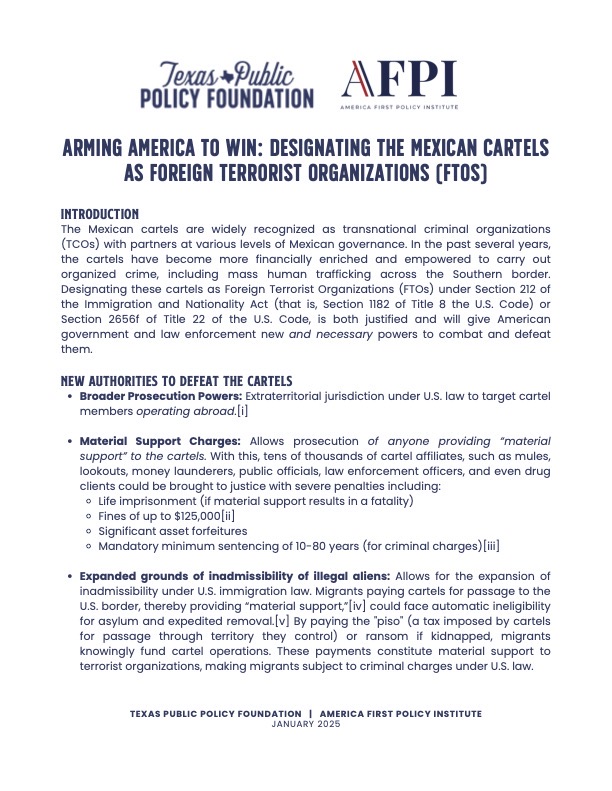January 20, 2025
Arming America to Win: Designating the Mexican Cartels as Foreign Terrorist Organizations (FTOs)
The Mexican cartels are widely recognized as transnational criminal organizations (TCOs) with partners at various levels of Mexican governance. In the past several years, the cartels have become more financially enriched and empowered to carry out organized crime, including mass human trafficking across the Southern border. Designating these cartels as Foreign Terrorist Organizations (FTOs) under Section 212 of the Immigration and Nationality Act (that is, Section 1182 of Title 8 the U.S. Code) or Section 2656f of Title 22 of the U.S. Code, is both justified and will give American government and law enforcement new and necessary powers to combat and defeat them.
New Authorities to Defeat the Cartels
- Broader Prosecution Powers: Extraterritorial jurisdiction under U.S. law to target cartel members operating abroad.[i]
- Material Support Charges: Allows prosecution of anyone providing “material support” to the cartels.With this, tens of thousands of cartel affiliates, such as mules, lookouts, money launderers, public officials, law enforcement officers, and even drug clients could be brought to justice with severe penalties including:
- Life imprisonment (if material support results in a fatality)
- Fines of up to $125,000[ii]
- Significant asset forfeitures
- Mandatory minimum sentencing of 10-80 years (for criminal charges)[iii]
- Expanded grounds of inadmissibility of illegal aliens: Allows for the expansion of inadmissibility under U.S. immigration law. Migrants paying cartels for passage to the U.S. border, thereby providing “material support,”[iv] could face automatic ineligibility for asylum and expedited removal.[v] By paying the "piso" (a tax imposed by cartels for passage through territory they control) or ransom if kidnapped, migrants knowingly fund cartel operations. These payments constitute material support to terrorist organizations, making migrants subject to criminal charges under U.S. law.
- Enhanced Asset Seizures: Expands the government's ability to freeze and confiscate cartel-linked assets. Beyond existing measures targeting senior cartel leadership, this authority enables U.S. agencies to pursue broader financial networks, crippling cartel operations by disrupting funding streams and resource distribution.
- Increased Prosecutorial Reach and Caseloads:Exponentially increase the pool of individuals subject to prosecution, as anyone associating with an FTO, even tangentially, becomes a potential target for investigation, watch listing, and prosecution. This aggressive prosecutorial stance would mirror successful counterterrorism strategies used against Islamist FTOs.[vi]
- Increased Political Leverage: The Mexican government, with its deep and ongoing ties to the cartels [vii], explicitly opposes an FTO designation. The consequences of an FTO designation could expose these connections, and it therefore constitutes a meaningful point of leverage versus the Mexican state to confront its own role in tolerating and even promoting organized crime.
References
